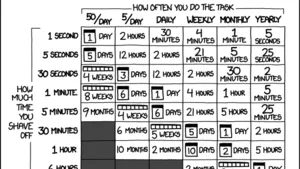Spreadsheets are a wonderful tool when used correctly. But when they're not, they can expose your business to significant, unnecessary risk, putting one of your business' most valuable assets – data – in harm's way.
There can be little argument that spreadsheets are a powerful tool for managing a business. In the main, they are relatively simple to use and, with a little know-how, can be made to fit almost any scenario.
On the surface, they are the perfect, one-size-fits-all solution to any business information management challenge you may be facing.
You can:
- Sort, index and organise.
- Create charts, graphs, and tables.
- Automate and analyse.
Yet, for many businesses, the power of the humble spreadsheet is under-appreciated – as is the damage that can be visited on your business when they go wrong.
So many businesses have recently made a rapid shift to home-working, that it feels like the perfect time to remind ourselves of the inherent problems you are inviting in when you rely too heavily on spreadsheets.
So without further delay, here are the 5 ways in which your spreadsheet addiction is risking your business.
1. Complexity
Sadly, the power and versatility of the humble spreadsheet can become its greatest weakness.
Was it originally intended to be a complex workbook full of formulae?
Or did it just develop into that over time?
The greater the complexity, the higher the risk of failure.
All too often, businesses are heavily reliant on the one 'Excel* whizz' who speaks fluent Excel* and can create complicated formulae and automation with their eyes shut. They may even 'lock' certain parts of a spreadsheet to protect it from accidental harm.
What happens when that person leaves your business or is simply not at work on the day something goes wrong?
*other spreadsheet software is available
2. Confidence
This could be the confidence of your users, or confidence in the program.
Spreadsheets can be unstable. Formulae can be fragile. Data validation can be tricky.
What if your spreadsheet contains a minor error that completely distorts the business information you subsequently rely on?
While many people possess a basic to intermediate working knowledge of spreadsheets, few are highly skilled in the deeper workings of the software. The risk of an employee accidentally overwriting a formula, or doing something to break interdependencies is high, and the potential damage, significant.
3. Control
Whoever holds control of the spreadsheet, holds control of your business!
Version control is an age-old problem.
How many times over the years have you seen versions labelled 0.1, 0.1a, Draft final, FINALfinal… You get the idea and that's just on the shared drive!
Imagine how many 'personal' versions your staff might have on their desktop, laptop or memory stick. When any of those versions are then shared by email the duplication escalates.
4. Clarity
Being limited to rows and columns, spreadsheets are only good for 2D data sets. What happens when you need to overlay more data sets?
How do you obtain a reliable and comprehensive helicopter view of your business information?
How do you identify trends?
5. Compliance
Last but not least, compliance.
Implementing robust security and compliance arrangements costs money, time and energy. You are required to satisfy complex legal obligations that carry severe, potentially catastrophic, financial penalties if you fail. Your clients choose their partners and suppliers based on their confidence in your ability to provide security.
Despite this how often do you send, or receive, emails with attachments?
The problem with this is that once the email is sent it effectively becomes public information. Whether it is then deliberately intercepted, or accidentally ends up with the wrong person, your standard email disclaimer won't protect you from the risk of non-compliance!
Aspire to go further
The good news is, there is another way.
You can see how we helped M&S overcome their spreadsheet addiction or get in touch today if you want to start your spreadsheet addiction rehab and discover ways to prevent spreadsheets from putting your business at risk.








